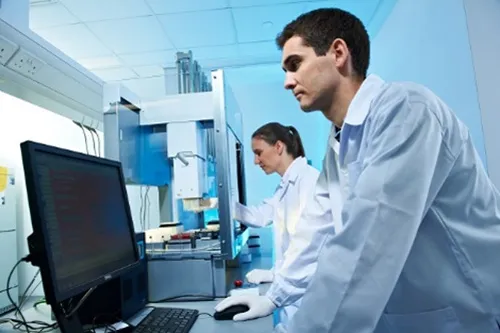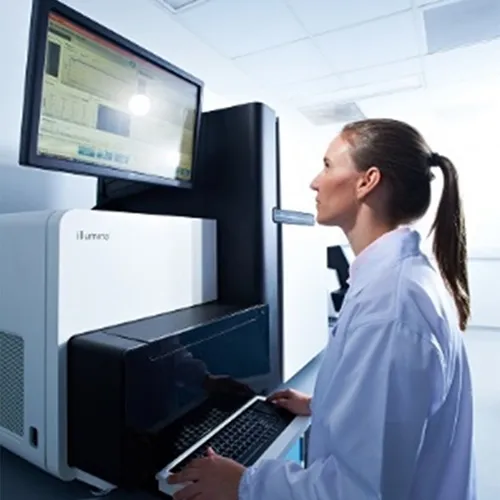SCELSE Facilities
SCELSE Sequencing Capacity
SCELSE’s sequencing facility is designed to provide researchers and collaborators access to cutting-edge, next-generation sequencing technologies. An average of 5,000 samples per year are sequenced at this facility.
SCELSE’s current sequencing capacity consists of two Illumina HiSeq 2500 platforms, two Illumina MiSeq sequencers as well as two Oxford Nanopore Technologies single-molecule sequencers, the high-throughput PromethION and the low-throughput MinION. These single molecule sequencers produce very long sequencing reads and are therefore ideal for de novo sequencing of microbial and other smaller genomes (MinION) as well as human, plant and other larger genomes or mixed microbial communities (PromethION). The single molecule sequencers are supported by a suite of specialised equipment that caters to production and handling of the longer DNA fragments required for these platforms.
Preparation of next-generation sequencing libraries for various applications is supported by a robust framework of other lab instruments, including the 10X Genomics Chromium for artificial long reads by in silico barcode ‘stitching’ of short reads, and a fleet of automated liquid handling robotics for library construction and library QC.
The facility works closely with sequencing-related companies to ensure continuous access to the latest technologies and sequencing products to stay abreast of the rapidly evolving technology associated with massively parallel sequencing.
The following applications are currently supported on the HiSeq2500 platform:
- Whole genome sequencing
- RNA-seq: transcriptome sequencing (including strand-specific libraries)
- De novo sequencing
- Metagenomic sequencing of complex environmental samples
- Targeted enrichment (sequence capture)
- Sequencing of mate-pair libraries
- Single-read or paired-end sequencing
- Multiplexed (barcoded) sequencing
Utilising State-Of-The-Art Technology

The MiSeq sequencer is a smaller desktop platform that allows researchers to go from sample to data in as little as one day. At a read length of up to 300bp, the MiSeq generates up to 10Gb of data, or ~30 million reads. Applications currently supported on the MiSeq platform include:
- small genome sequencing
- RNA-seq: transcriptome sequencing (including strand-specific libraries)
- small RNA sequencing
- amplicon sequencing
- genome resequencing
- de novo sequencing
- ChIP-Seq
- library QC
- targeted enrichment (sequence capture)
- single-read or paired-end sequencing
- multiplexed (barcoded) sequencing
Preparation of next-generation sequencing libraries for various applications is supported by a robust framework of other lab instruments, including the 10X Genomics Chromium for artificial long reads by in silico barcode ‘stitching’ of short reads, and a fleet of automated liquid handling robotics for library construction and library QC.
The facility works closely with sequencing-related companies to ensure continuous access to the latest technologies and sequencing products to stay abreast of the rapidly evolving technology associated with massively parallel sequencing. A Laboratory Information Management System (LIMS) is used to evaluate projects and track the workflow of the different services that SCELSE provides and also enables the users to track the status of their projects and requests online.
SCELSE has closely integrated expertise in computational biology such as bioinformatics, biostatistics, and systems biology into its facility in order to optimise throughput, data handling, and analyses of the massively parallel data sets and also to provide a crucial bridge between the experimental platform and the users. SCELSE’s bioinformatics team uses in-house tools as well as commercially available software for sequencing data analysis. The centre’s work is supported by an in-house computer cluster consisting of 12,288 CPU-cores, low-latency high-throughput Infiniband 100Gb/s EDR interconnect technology, together with a high-performance DDN GS7990 data storage system (30 GB/s; 1.9 petabytes).
SCELSE works closely with sequencing-related companies to ensure continuous access to the latest technologies and sequencing products to stay abreast of the rapidly evolving technology associated with massively parallel sequencing.

For enquiries regarding the SCELSE sequencing facility, please contact us at scelse-sequencing@ntu.edu.sg
